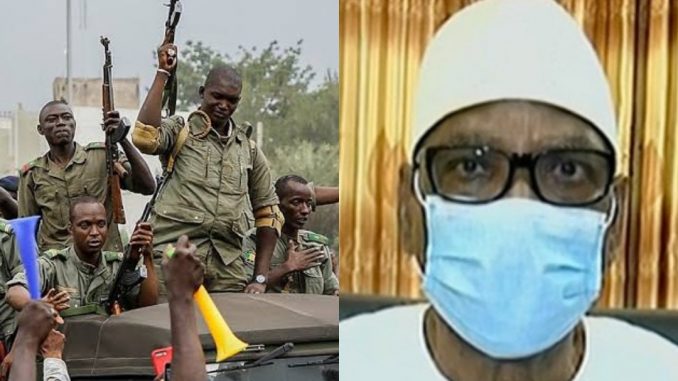
Mali plunges into political uncertainty as military forces Ibrahim Boubacar Keita out of the presidency.
Malian President Ibrahim Boubacar Keita announced around midnight on Tuesday that he is resigning from his post saying that he does not wish blood to be shed following a military mutiny that plunged the country into a political crisis.
“Today, certain parts of the military have decided that intervention was necessary. Do I really have a choice? Because I do not wish blood to be shed,” Keita said in a brief statement broadcast on national television.
Keita said that he has decided “to give up my duty from now on.”
It is unclear if the military is now officially in charge of the country.
Earlier, Keita and Prime Minister Boubou Cisse were detained by soldiers in a dramatic escalation of a months-long crisis in the country.
The development came hours after soldiers took up arms and staged a mutiny at a key base in Kati, a town close to Bamako.
Mali president, prime minister arrested in apparent coup
The soldiers were expected to deliver a statement later, while countries in West Africa, along with former colonial power France, the European Union and the African Union, denounced the actions of the soldiers and warned against any unconstitutional change of power.
The events came amid a weeks-long political crisis that has seen opposition protesters taking to the streets to demand the departure of Keita, accusing him of allowing the country’s economy to collapse and mishandling a worsening security situation.
MORE ON AFRICA
ALSO READ: Mali president resigns after military mutiny
ALSO READ: Faction of DR Congo rebel group surrenders after internal revolt
Mali’s years-long conflict, in which ideologically-motivated armed groups have stoked ethnic tensions while jockeying for power, has spilled into the neighbouring countries of Niger and Burkina Faso, destabilising the wider Sahel region and creating a massive humanitarian crisis.
Aljazeera said, earlier on Tuesday, opposition protesters gathered at a square in Bamako in a show of support for the soldiers, while foreign embassies advised their citizens to stay indoors.
Here are the latest updates:
Wednesday, August 19
Soldiers behind the coup appear on TV
The soldiers behind the coup – calling themselves the National Committee for the Salvation of the People – appeared on state television in military fatigues, pledging to stabilise the country.
“We are not holding on to power but we are holding on to the stability of the country,” said Ismail Wague, Mali Air Force’s deputy chief of staff.
“With you, standing as one, we can restore this country to its former greatness,” said Wague, announcing borders were closed and a curfew was going into effect from 9pm to 5am.
“This will allow us to organise within an agreed reasonable timeframe, general elections to equip Mali with strong institutions, which are able to better manage our everyday lives and restore confidence between the government and the governed.”
Mali’s Keita resigns as president
Looking tired and wearing a surgical mask, Keita announced his resignation in a brief address broadcast on state television [Al Jazeera screenshot]
Mali President Ibrahim Boubacar Keita resigned around midnight on Tuesday and dissolved parliament hours after mutinying soldiers detained him at gunpoint, plunging a country already facing an insurgency and mass protests deeper into crisis.
Looking tired and wearing a surgical mask, Keita resigned in a brief address broadcast on state television after troops seized him along with Prime Minister Boubou Cisse and other top officials.
“Today, certain parts of the military have decided that intervention was necessary. Do I really have a choice? Because I do not wish blood to be shed,” he said from a military base in Kati outside the capital Bamako where he had been detained earlier in the day.
ECOWAS bloc condemns Mali coup attempt
The Economic Community of West African States (ECOWAS) has condemned the coup attempt in Mali and has moved to suspend the country from its decision-making body, according to Al Jazeera’s Ahmed Idris, who is reporting from Abuja in Nigeria.
In an announcement, the regional alliance also said that neighbouring countries of the West African state are closing its borders and will impose sanctions as the crisis continues.
Go here to read how Mali’s months-long political crisis culminated to Tuesday’s events.

